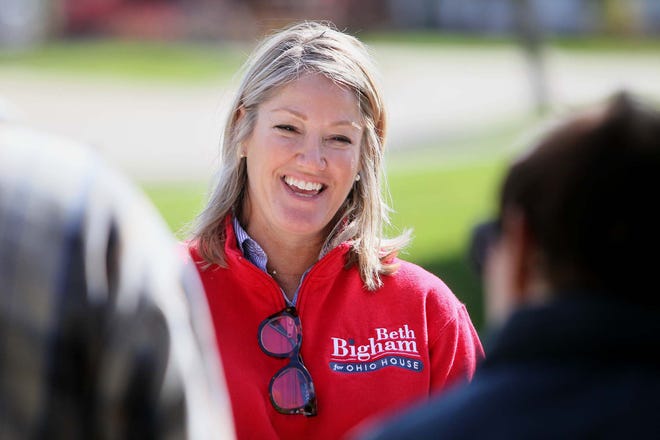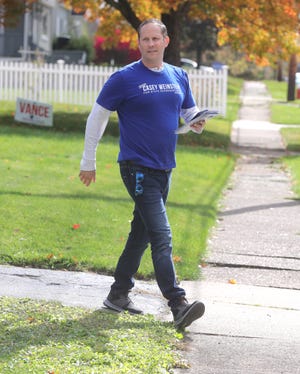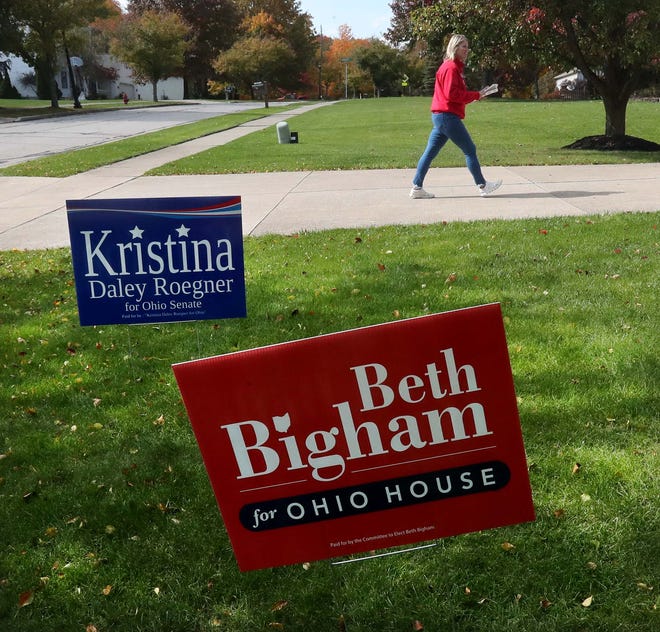

State Rep. Casey Weinstein, D-Hudson, makes no apology for shouting down right-wing extremism on Twitter.
“This job is all about showing up,” he said, jabbing his Republican challenger for missing council meetings and candidate forums arranged by the Hudson Rotary Club and League of Women Voters.
Beth Bigham, his Republican opponent, doesn’t trust those “absolutely not nonpartisan” groups.
“They’re irrelevant to me. It’s just not worth it,” she said. “I want to talk to undecided voters. I’m meeting them where they are. I’m going to their homes. I’m going to their groups. That’s a decision I’ve made. And, ultimately, I have agency. I have agency to determine my own path.”
One of the most competitive and confrontational Statehouse races in Ohio is about to get uglier as hundreds of thousands of dollars raised by Weinstein’s campaign or outside spending groups backing Bigham will be unleashed in the next two weeks on voters in Cuyahoga Falls, Hudson, Stow and the northernmost tips of Akron.
2022 Election:Who to vote for? Summit County Voter Guide has candidate information in their own words
The 34th House District race features two Hudson residents who claim to champion tolerance and empathy, who share deep roots in faith and family. But their political punches land more on the personal than the policy side — like Weinstein trolling MAGA (“Make America Great Again”) Republicans, getting mocked for a dog bite on the campaign trail or an antisemitic tweet this week by an account allegedly supporting Bigham before it was quickly deactivated.
Bigham criticizes Weinstein for missing key votes in the Ohio House or when they briefly served together on Hudson City Council. She accuses the incumbent of being “condescending to Republicans” on Twitter where he throws gasoline on burning social issues.
“I’m always friendly with him when I see him. But it’s tough during campaign season,” Bigham said. “Aside from all of his craziness and his Twitter bashing and hate, if I put all that away in my mind, he’s a likable guy.”
Weinstein defends his aggressive advocacy, saying he won’t stop fighting for marginalized groups that get more support from him than his opponent.
“I have a platform to be able to speak loudly against (extremism). I will continue to do that. I promise,” Weinstein said of using his voice to drive conversation when the GOP-dominated Ohio House blocks his legislative efforts to support the lesbian, gay, bisexual, transgender community; criminal justice reform; and marijuana legalization; or to fight anti-semitism, Holocaust denial and hate crimes.
On the issues of abortion, on repealing the state income tax or trusting traditional news media, the candidates couldn’t be further apart. But they have more in common personally than the caricatures they and their supporters are painting.
‘It’s your responsibility’: Their paths to public service
Bigham, 48, and Weinstein, 40, each settled in Hudson as adults with their growing families.
Elected in 2015, Weinstein served on Hudson City Council until joining the Ohio House in 2019. Bigham is wrapping up a sixth year on City Council. She ran and lost against Weinstein two years ago.
Each grew up in families that modeled public service.
Bigham graduated from West Branch High School in the early 1990s. She watched her father, a Democrat who still serves on the public affairs board for his small Mahoning County village of Beloit, build park benches in a blue-collar community steeped in the Americana of farm fields and Friday night football games. Her stepmother serves on the village council, and her stepbrother was a mayor in a nearby town.

“You work your ass off to achieve the American dream, right?” Bigham said she learned from her hardworking neighbors. “It’s your responsibility to do that and also to take care of your community. And I saw that time and time again, growing up.”
Taking his family all over the country while serving in the military, Weinstein’s father pulled his son out of school for a day in 1988 to meet the World Champion Los Angeles Dodgers in the Rose Garden of the White House — the same place Weinstein brought his daughter last month when President Joe Biden held the first White House celebration of Rosh Hashanah, the Jewish New Year.
Weinstein’s father, who has since left the Republican Party, served as general counsel in President Ronald Reagan’s administration, where he worked on “Iran Contra stuff” and a government antitrust lawsuit against telecommunications giant AT&T.

Weinstein worked for then-candidate Barack Obama’s 2008 campaign in Clark County near Springfield, not far from were he and his wife, each a first lieutenant captain in the active reserves, were stationed at Wright-Patterson Air Force Base in Dayton.
“I really felt like I was making a difference. And that is what I’m seeking out, whether it’s in office or being involved with the mission, or in that case (on the Obama campaign), someone who was trying to make a real impact.”
Family and education
Bigham met her husband, George, at Kent State University. He studied architecture. She studied nursing. Fortune put them in the same car in the university’s 1995 homecoming parade.
They married three years later and have three children — two daughters and a son.
While earning an MBA, Bigham launched Medical Prophet, a health care consultancy that started in genetic testing to screen for cancer but, with that technology too far ahead of the market, pivoted to advising construction companies on the challenges of building in the medical settings.
After doing well as a builder before the housing crisis, Bigham’s husband took his master’s degree in construction management from Clemson, where Bigham earned her master’s as a nurse practitioner, to teach the program at Kent State before restarting his construction company.
Weinstein met his wife, Amanda, in the Air Force Academy. In a humbling moment they can laugh about, Amanda lifted a wall-mounted television that fell on Casey in the gym.
They married two years later and have three children — two daughters and a son.
Weinstein followed his wife when she was stationed at the air base in Dayton. In Ohio, he got his MBA from Ohio State University. His wife teaches at the University of Akron with her Ph.D. in applied economics, a doctorate-level degree Bigham’s husband has nearly completed in construction technology and sustainability.

Faith: ‘It’s given me empathy … made me more compassionate’
Religious faith factors as deeply as family in how Weinstein and Bigham serve their communities.
As a Jew following his father, grandfather and uncles into the military, Weinstein said he encountered chaplains citing Bible verse and the perception of Christianity as “the de facto religion” and basis for “a really strong religious intolerance at the Air Force Academy.”
He joined fellow cadets, who were Christian, in suing the United States Air Force for “evangelizing, proselytizing and otherwise actively challenging the religions” of cadets. The experience, for Weinstein, was the first of many in which the young man would stand up for marginalized groups, not only on religious freedom, but on issues of social, criminal and environmental justice.

“I think that I’m used to being in the deep minority as a Jewish person,” said Weinstein, who like Bigham has served on Hudson City Council in the political minority.
“It’s given me some level of understanding of what it’s like to not be in the majority,” he said of his Judaic faith. “I would not compare it in any way to being Black or something so visibly obvious for people, but … I feel like it’s given me empathy for those who are not in the majority, for those who are in the minority and who feel like they’re on the outside looking in.”
Bigham, whose focus on City Council has been on raising transparency and reining in spending, is Protestant. That didn’t stop her from attending an Ash Wednesday service at the Ocean Drive Presbyterian Church in North Myrtle Beach about 15 years ago.

Anointing her with oil and ashes, the pastor said: “I pray that God would give you windows into heaven, so you can look in with great joy.”
She went back to her pew and wrote that in her Bible. Earlier that day, while wallowing in the pain of losing her second child, who lived for six weeks from birth with hospice in their home, Bigham’s 2½-year-old son woke her from a nap at the condo her husband had built by the ocean in South Carolina. The boy showed her a house he’d built with interconnecting blocks.
“He said, ‘Mama, mama, I made heaven for you, with a window,’ ” she recalled.
“The pain I’ve had to go through, I think it’s made me more compassionate,” she told the Beacon Journal. “… On the other side of the coin, it has made me much stronger.”
“I’m not afraid, right?” she continued. “Like, what do I have to fear in life? I’ve already been through the worst. I’ve been through a kind of hell, and I made it back. And I have an eternal perspective. So, I mean, this is temporary.”

The experience also informs her fundamental opposition to abortion. Saying she’d rather talk about “things that people care about, which is the economy,” Bigham pivoted to “life, liberty and the pursuit of happiness” from the Declaration of Independence and Gov. Mike DeWine’s bipartisan work on infant mortality.
“I’ve always been clear that I’m pro-life, and I spent my career saving lives,” she said when asked how far she would restrict access to abortion. “I find it difficult to think of a time when it would be a good idea to take an innocent life.”
Reach reporter Doug Livingston at dlivignston@thebeaconjournal.com or 330-996-3792.







